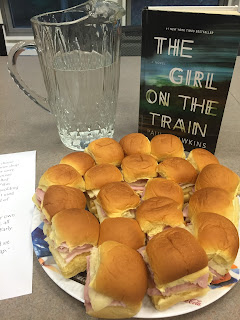We also had great fun with a holiday cookie exchange.
 |
| Just some of our holiday treats! |
Author Bios & Interviews - Charles Dickens
- http://www.biography.com/people/charles-dickens-9274087#early-life
- http://www.dickensfellowship.org/life-charles-dickens
- http://www.victorianweb.org/authors/dickens/dickensbio1.html
- http://www.dickens-online.info/charles-dickens-biography.htm
 Author Bios & Interviews - Les Standiford
Author Bios & Interviews - Les Standiford- http://www.les-standiford.com/about.html
- http://www.harpercollinsspeakersbureau.com/speaker/les-standiford/
- http://therumpus.net/2015/08/the-rumpus-interview-with-les-standiford/
- http://www.publishersweekly.com/pw/print/20010226/24189-les-standiford-a-handyman-special.html
Book Reviews - A Christmas Carol
- https://www.theguardian.com/childrens-books-site/2013/dec/24/review-a-christmas-carol-by-charles-dickens
- http://theinvisiblementor.com/a-christmas-carol-charles-dickens-book-review/
- http://wkar.org/post/book-review-charles-dickens-christmas-carol
- https://mvlteenvoice.com/2014/01/08/book-review-a-christmas-carol-by-charles-dickens/
- http://www.teenink.com/reviews/book_reviews/article/519017/A-Christmas-Carol-by-Charles-Dickens/
Book Reviews - The Man Who Invented Christmas
- http://www.nytimes.com/2008/12/06/arts/06iht-IDLEDE6.1.18330401.html?_r=0
- https://bookpage.com/reviews/5902-les-standiford-man-who-invented-christmas#.WFmZqtIrIdU
- http://www.washingtonpost.com/wp-dyn/content/story/2008/11/28/ST2008112801604.html
- http://www.csmonitor.com/Books/Book-Reviews/2010/1219/Classic-review-The-Man-Who-Invented-Christmas
- http://www.publishersweekly.com/978-0-307-40578-4

Discussion Questions - A Christmas Carol
- http://galesburglibrary.org/wp-content/uploads/2013/10/ChristmasCarol.pdf
- http://classiclit.about.com/od/christmascarola/a/aa_christcarol_questions.htm
- http://www.fab-bookclub-recommendations.com/a-christmas-carol-charles-dickens.html
- http://www.victorianweb.org/authors/dickens/xmas/pva126.html
- http://www.sparknotes.com/lit/christmascarol/study.html
Discussion Questions - The Man Who Invented Christmas
Movie Tie-In - A Christmas Carol
A Christmas Carol has been made and re-made into a movie (as well as stage productions) numerous times. Below are just some of the adaptations of this classic tale. For any that are missing, please add them to the comments section below!
- An All Dogs Christmas Carol (1998)
- An American Christmas Carol (1979)
- A Carol Christmas (2003)
- Disney's A Christmas Carol (2009)
- Diva's Christmas Carol (2000)
- Ebbie (1995)
- A Flintstone's Christmas Carol (1994)
- Ghosts of Girlfriends Past (2009)
- Mickey's Christmas Carol (1983)
- The Muppet Christmas Carol (1992)
- Scrooged (1988)
- The Stingiest Man in Town (1978)
Movie Tie-In - The Man Who Invented Christmas
- http://www.imdb.com/title/tt6225520/
- http://screencrush.com/dan-stevens-the-man-who-invented-christmas/
- http://www.denofgeek.com/uk/movies/the-man-who-invented-christmas/45141/dan-stevens-to-play-charles-dickens-in-new-film
- http://deadline.com/2016/11/the-man-who-invented-christmas-movie-dan-stevens-christopher-plummer-jonathan-pryce-bleecker-street-1201850202/
- http://www.thehollywoodnews.com/2016/11/08/the-man-who-invented-christmas-cast/
- http://geektyrant.com/news/dan-stevens-and-christopher-plummer-join-charles-dickens-film-the-man-who-invented-christmas
Miscellany
- Illustrations from the original publication of A Christmas Carol: http://charlesdickenspage.com/illustrations-carol.html
- A teacher's guide to using A Christmas Carol in the classroom: http://www.penguinreaders.com/pdf/downloads/pr/teachers-notes/9781405842822.pdf
- A Christmas Carol study guide: http://www.capa.com/files/about/a-christmas-carol-study-guide.pdf
- Joyce Carol Oates's review of Claire Tomalin's biography on Charles Dickens: http://www.nybooks.com/articles/2012/08/16/mystery-charles-dickens/
Holiday Cookie Exchange Recipes
- Cake batter truffles: http://www.chef-in-training.com/2011/09/no-bake-cake-batter-truffles-take-2/
- Strawberry chocolate chip cookies: http://sallysbakingaddiction.com/2013/01/23/strawberry-chocolate-chip-cookies/
- http://communitytable.parade.com/551534/alisonashton/dolly-partons-thumbprint-cookies/
- For other holiday cookie exchange recipes, email jen @ southriverlibrary.org for PDF versions.

















